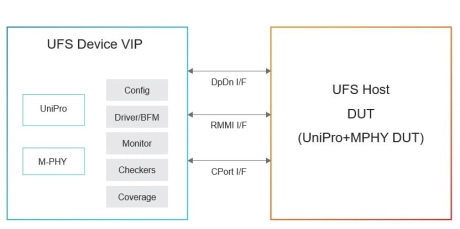UFS IP
The Universal Flash Storage (UFS) Host Controller IP is a standard-based serial interface engine for implementing the JEDEC UFS interface in compliance with the JEDEC UFS, UFS Host Controller Interface (UFSHCI) standards as well as the UFS removable card v1.1 standards.
UFS stands for "Universal Flash Storage." It is a type of non-volatile memory used in many mobile devices, such as smartphones and tablets, as well as in some digital cameras and other electronics.
All offers in
UFS IP
Filter
Compare
32
UFS IP
from
10
vendors
(1
-
10)
-
Verification IP for UFS
- Avery UFS/Unipro VIP provides a comprehensive verification solution featuring an advanced UVM environment that incorporates: constrained random SCSI and Unipro traffic generation, robust packet and physical layer controls and error injection, protocol checks and coverage, functional coverage, protocol analyzer-like features for debugging, and performance analysis metrics.
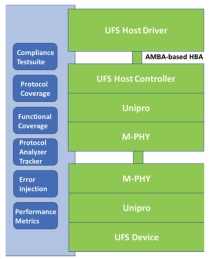
-
UFS 4.0 Host
- UFS 4.0 (JESD220F.pdf)
- UFS HCI 4.0 (JESD223E.pdf)
- MIPI UniPro version 2.0(mipi_UniPro_specification_v2-0.pdf)
- MIPI M-PHY version 5.0(mipi_M-PHY_specification_v5-0.pdf)
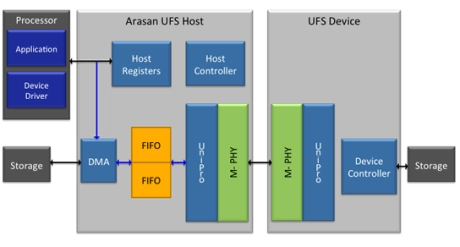
-
UFS 3.1 host
- The Universal Flash Storage 3.1 (UFS 3.1) is a simple but high-performance, serial interface primarily used in mobile systems, between host processing and nonvolatile eXecute-In-Place (XIP) or mass storage memory devices.
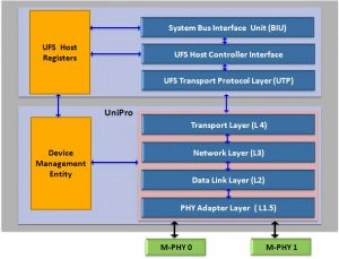
-
UFS 3.0 Host
- UFS 3.0 Host and Device configurations available
- Complete UFS 3.0 hardware implementation
- Interop-proven UniPro 1.8 link layer
- MIPI M-PHY 4.0 Interface
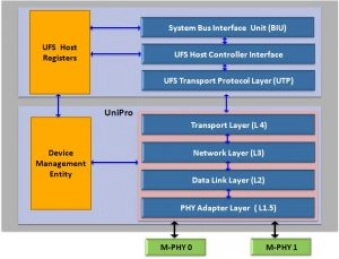
-
UFS 2.1 Stack & Driver
- Compliant with JEDEC UFS HCI 2.0 and MIPI UniPro Specification version 1.6
- Portability in choice of OS, processors and hardware
- Easy-to-use interface for applications
- Fully documented generic device operation API
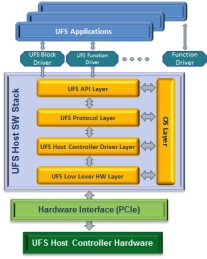
-
UFS 2.1 Host Controller IP
- JEDEC UFS 2.0 and UFS HCI 2.0 Compliant
- Supports high performance M-PHY v3.0 type-1
- 2 lanes @ 5.9 Gbps per lane
- UniPro v1.6 link layer
- Definable write-protect group size
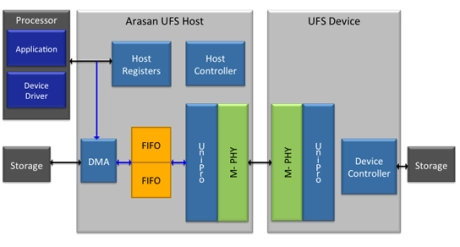
-
UFS 2.1 Device Controller IP
- The UFS 2.1 Device controller uses an M-PHY® 3.1 Adapter Layer backed by a UniPro v1.6 Link layer controller as per the specification.
- The UFS compliant IP cores are interface building blocks that simplify interconnect architectures in mobile platforms.
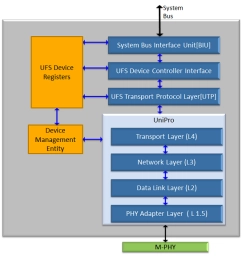
-
MIPI M-PHY® 3.1 Analog Transceiver
- The M-PHYs are of Type 1, which apply to UFS, LLI and CSI-3 protocols.
- The Multi-gear M-PHY 3.0 consists of analog transceivers, high speed PLL, data recovery units as well as the state-machine control — all in a single GDSII.
- The interface to the link protocol-specific controller (host or device) is compliant to the M-PHY RMMI specification, which allows seamless integration of the two IPs, namely the controller and the PHY, into the chip design.
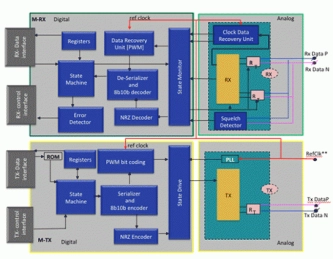
-
UFS Controller - Verifies compliance and performance of UFS interfaces in SoCs
- The UFS Controller Verification IP (VIP) ensures proper operation and compliance of UFS interfaces in SoC designs. It supports UFS 2.0, 2.1, 3.0, and 3.1 standards, enabling efficient validation of high-speed data transfers and power management.
- The VIP is critical for validating UFS controllers in a wide range of applications, from AI/ML systems to mobile devices and automotive infotainment. It ensures optimal performance, reliability, and seamless integration in diverse environments
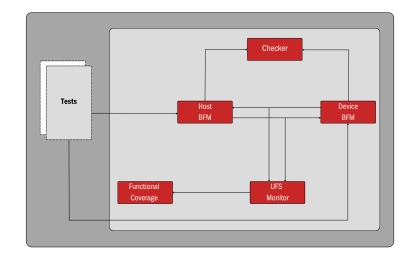
-
Simulation VIP for UFS
- Interfaces
- DPDN I/F and RMMI I/F when used with UniPro VIP. CPort signaling pin I/F and CPort message using transactions
- UTP Layer - UPIUs
- NOP IN, NOP OUT, Query Request/ Response, Task Management Request/ Response, Command, Response, Data Out, Data In
